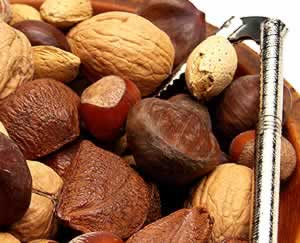Wild About Nuts

Nuts are a great snack on the fly, but you don’t have to just eat them out of hand: they are also wonderful in salads, as a crust for poultry and seafood entrees, and even puréed as a thickening agent in chilled or hot soups. With at least a dozen varieties available everywhere, some of the most popular are almonds, walnuts, cashews, pecans, peanuts, Brazil nuts, pine nuts, hazelnuts, pistachios, and macadamias.
Go a little nuts every day
To work these tasty treats into your daily routine, give one of the following a try:
- Caramelize your favorites—Heat a sauté pan to medium, add 1 teaspoon (0.17 ounces) of canola or olive oil, and add any variety of raw nuts. Keep the contents moving constantly while adding 1 tablespoon (0.5 ounces) of sugar for each cup (8 ounces) of nuts. Stir until you notice the irresistible aroma of the sugar turning to caramel (about 2 minutes) and immediately transfer to a plate and cool. For more adventurous snacks, add a sprinkle of sea salt, tamari, and a pinch of cayenne pepper while sautéing.
- Get nutty—Enjoy your caramelized treats alone or tossed in your own house mix with dried fruits and whole grain cereals. Or serve over mixed green salads with sliced fresh seasonal or dried fruits. Add some extra virgin olive oil or walnut oil, raspberry vinegar, and—boom! Your mouth won’t believe the taste.
- Make a nut encrusted masterpiece—Try this wonderfully crunchy coating on any seafood or poultry by adding 1/3 cup (2.5 ounces) of chopped nuts to 1 cup (8 ounces) of bread crumbs, chopped parsley, and salt and pepper. Dip the fish or chicken into a bit of milk, buttermilk, or yogurt and press into the crumb mixture. Bake on an oiled baking dish in a preheated oven at 375°F (190°C) until cooked through.
Get health and taste—all in the same mouthful
When eaten in moderation—a small handful each day—nuts provide a rich source of protein and may assist in lowering the risk of heart disease and diabetes. They are also a good source of dietary fiber and each supplies its own antioxidant protection or other benefits from essential nutrients such as B vitamins and vitamin E, and minerals such as iron, magnesium, selenium, and potassium.
Buy, store, and enjoy fresh
Nuts don’t have a long shelf life, so look for the freshest options to avoid those that have lost their beneficial nutrients. Raw and unsalted provide the most health benefit. To preserve them longer, place in small bags and freeze. Ask your store if they offer any fresh nut butters or buy some nuts in bulk and try making your own.
Copyright © 2026 TraceGains, Inc. All rights reserved.
